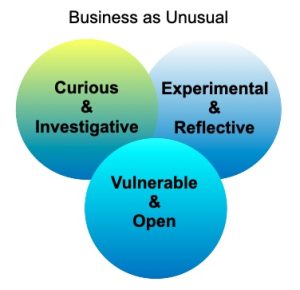Startup to Flourish Relational Plans Make Business Plans Work
 Startup to Flourish—between divisive excess wealth and unjust extreme poverty. Flourishing involves commonwealth, built on tacit agreement of the people for the common good. New ventures are progressively more likely to be founded with an intent to flourish. New ventures must interact differently with customers, employees and the community to flourish in the web of today’s world.
Startup to Flourish—between divisive excess wealth and unjust extreme poverty. Flourishing involves commonwealth, built on tacit agreement of the people for the common good. New ventures are progressively more likely to be founded with an intent to flourish. New ventures must interact differently with customers, employees and the community to flourish in the web of today’s world.
In order for a startup to flourish, the business has to be concerned not only on how it’s doing, but also on how it is being. Startup success has traditionally been judged on its economic performance: in terms of growth and profitability. Hence entrepreneurs are invoked to prepare Business Plans, something I fully support that, and here’s a couple of links for help elsewhere on Venture Founders: Business Plan Outline and Business Plan Mistakes and How to Avoid Them.
But who ever heard of Relational Plans? There is a continuous high rate of startup attrition as a consequence of entrepreneurial ignorance of relationships as the most important of business all critical success factors. Successful founders know the paramount importance of relationships for their startup to flourish.
Relational Plans Are the Key for a Purpose Driven Startup to Flourish
When you hear business relations discussed, it is generally in the context of marketing policies. It is seldom in terms of human relations or relations with the natural world. Managers in sales and marketing are familiar with CRM—customer relationship management. Indeed there are many computer-based CRM products on the market to facilitate the process. My experience is that they are mainly concerned with one-way traffic about how to build sales, rather than two-way relational issues. From CRM, there has also evolved SRM (Supplier Relationship Management), or VRM (Vendor Relationship Management), to ensure a company’s purchasing activity runs smoothly.
Innovative businesses have evolved ERM, or Employee Relationship Management, a more sophisticated approach to Industrial Relations or HR Management, beyond matters such as pay & conditions, remuneration & benefits and standing operating procedures for staff management.
All of these concern ‘business as usual’. Relational planning is inclusive of business as usual, but delves into ‘business unusual’. For a startup to flourish, it goes beyond transactional1 or extractive2 relations into transformational3 and regenerative4 ones.
 Relational planning leads to stronger business performance. It’s true that relationships happen—much of the time without planning—and they can be good, bad, or indifferent. It is much better that they be intentional rather than inadvertent or worse, careless. It’s about planting seeds, being open to the unexpected and growth—not about winners and losers.
Relational planning leads to stronger business performance. It’s true that relationships happen—much of the time without planning—and they can be good, bad, or indifferent. It is much better that they be intentional rather than inadvertent or worse, careless. It’s about planting seeds, being open to the unexpected and growth—not about winners and losers.
Relational planning is not specific to any individual business function. It concerns all material and immaterial relations—with people and the environment.
What is exciting for entrepreneurs is that their business has no precedent or long existing norms of behavior. They can create relations with all their stakeholders in ways that establish the way the business does business.
Relational Plans Needs Honesty and Compassion
Relational planning starts with a way of being. That does not negate the need for business planning, but it sets the way for the startup to prosper. Not surprisingly, research at Deloitte showed that purpose-driven companies witness higher market share gains and grow three times faster on average than their competitors, all while achieving higher workforce and customer satisfaction.
The way of being is not about clever mission and values statements. To be positive, it comes from frail honesty and active compassion. It need continuous work if the relations are to have impact over time. Relational planning may seem a ‘nice to’, rather than a ‘must do’ activity in the face of tough commercial decision making. New business founders are inevitably fraught with tough choices about priorities, but they must keep questioning themselves about why they are in business.
Questioning ‘why the business is in business’ is be hard. Some answers are uncomfortable or unanswerable. Others will lead to positive innovations, fulfillment and flourishing. The journey between transactional or extractive relationships to transformational or regenerative ones, will take you down the road from insensitivity to perception. The startup that gains perception will be reminded about the earliest days around the time of the business launch, when everything seemed possible and the fear of failure was constant. The flourishing business maintains its generosity and openness.
The Relational Plan Process for Startup to Flourish—Business as Unusual
Relational plans do not just happen. They need a conscious and repetitive effort. Done well their implementation will become part of the nature of the business. To start with, people in the groups doing the planning will need certain personal characteristics to be part of their approach to the work. The behaviors needed may not come naturally and will have to be part of participant learning.
My experience tells me that founders are both curious and investigative by nature. Certainly on the Belbin team roles model I came out strongly as a ‘resource investigator’. I strongly recommend that you examine the other eight Belbin team roles, because you’ll need them all. Successful founders also tend to good experimenters (hence why they so often ‘pivot’) and naturally reflect on out-turns.
However, without vulnerability and openness, especially to negative experiences, teams may fall into the corporate planning trap of control issues and ‘Biz School taught me there’s only one way to plan’—it’s all about the numbers.
For the startup to flourish, the relational planning process involves prioritizing relationships with people among all stakeholders. Starting with stakeholders is a different take on the corporate planning tradition and may be a tough exercise in itself. There are many versions of Stakeholder Maps, but none will perfectly fit your venture’s own territory. So you’ll have to make your own. Here’s a shortcut: 50 Free Stakeholder Analysis Templates to help you on your way. Don’t forget, this is not a once-off job. You’ll be revisiting as you monitor the venture’s development. Note: both Belbin Team Roles and Stakeholder Maps are British by origin, just like me.
Everyone Carries Boxes For a Startup to Flourish
 In a relational business, everyone carries boxes. Why do I say that? It’s a maxim that we developed back in the 1980s for our company, as a reminder that we all had responsibility for the business and nobody could use expressions like, “it’s above/below my pay grade”, “that’s not my job”, “I’m not paid to do that”, or “it’s not in my job description”. We were all ‘the company’ and related as fellow humans, rather than rank and file, taking full ownership for both strategic and mundane relationship issues.
In a relational business, everyone carries boxes. Why do I say that? It’s a maxim that we developed back in the 1980s for our company, as a reminder that we all had responsibility for the business and nobody could use expressions like, “it’s above/below my pay grade”, “that’s not my job”, “I’m not paid to do that”, or “it’s not in my job description”. We were all ‘the company’ and related as fellow humans, rather than rank and file, taking full ownership for both strategic and mundane relationship issues.
We started our company in 1982 and were determined to succeed, so we did everything we could to run a company whose staff would assume interdependence, not succumb to hierarchy and separateness. The intent passed through us both to our customers and our community.
This is why excess wealth and extreme poverty are divisive, not integrative, and lead to ultimate failure of the whole community. We have collective responsibility and all have to bring our small piece to the puzzle.
Happily, founders are in a position to create the conditions not only for their own startup to flourish, but thereby to bring their small contribution for the community and the world to flourish.
What is a Relational Plan?
A business plan defines business operations: structure, objectives, milestones & financials—how & why the business will succeed.
A relational plan defines how people will relate to one another, inside and outside the business—all of those whom it impacts. Both personal and impersonal relationships are included; those that concern individuals and the environment.
It sets standards & expectations. Everyone in the business is implicated. Ambiguities will require study, learning, dialog & monitoring.
- Transactional relationships involve expectations of an immediate exchange of something valuable between two people.
- Extractive relationships involve taking something out, without putting anything in its place.
- Transformational relationships are about giving, creating a bigger pie, more love or meaning, and even a better world.
- Regenerative relationships are those that nourish mind, body, soul, community… and the planet—putting back, rather than depleting.






